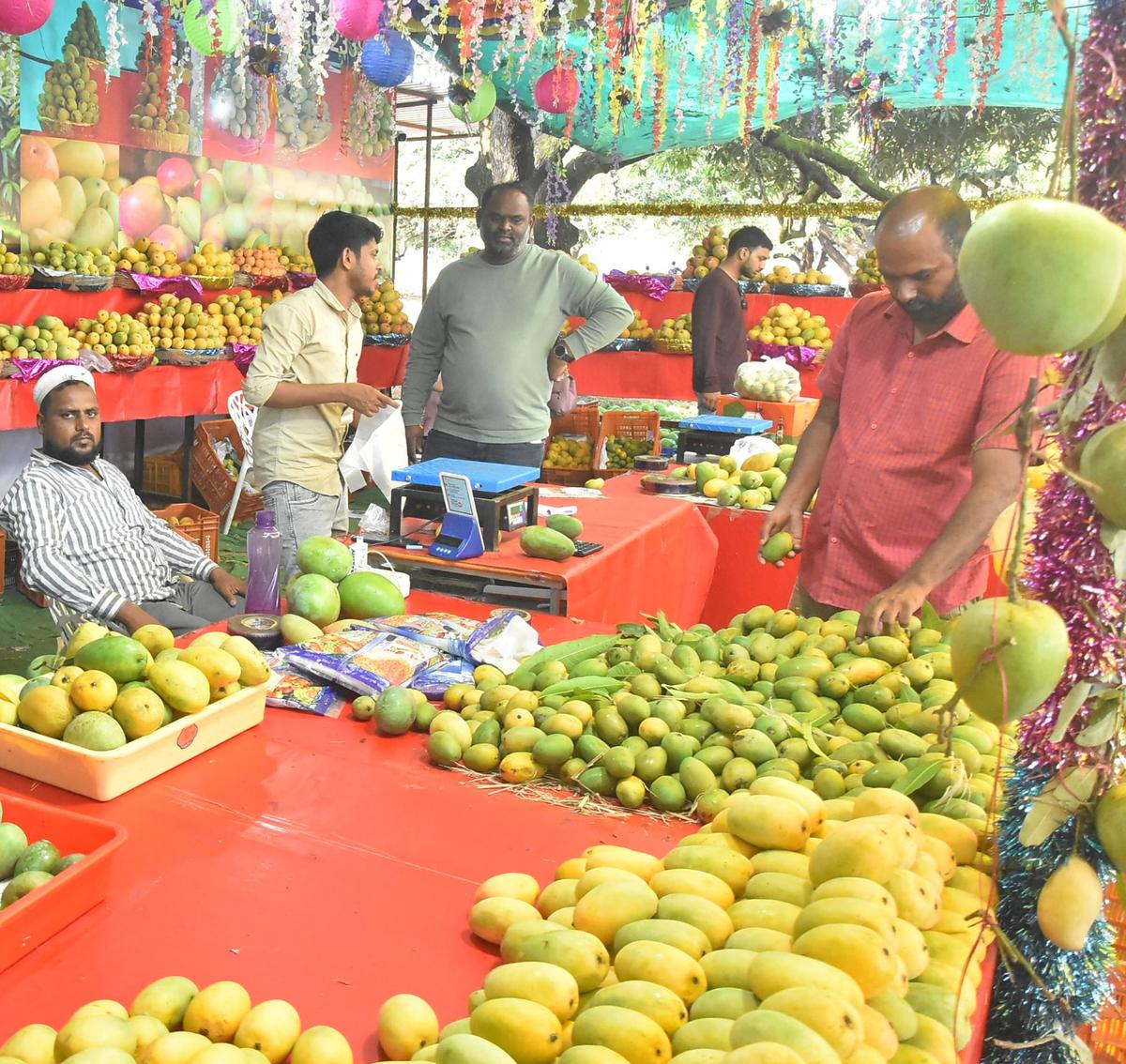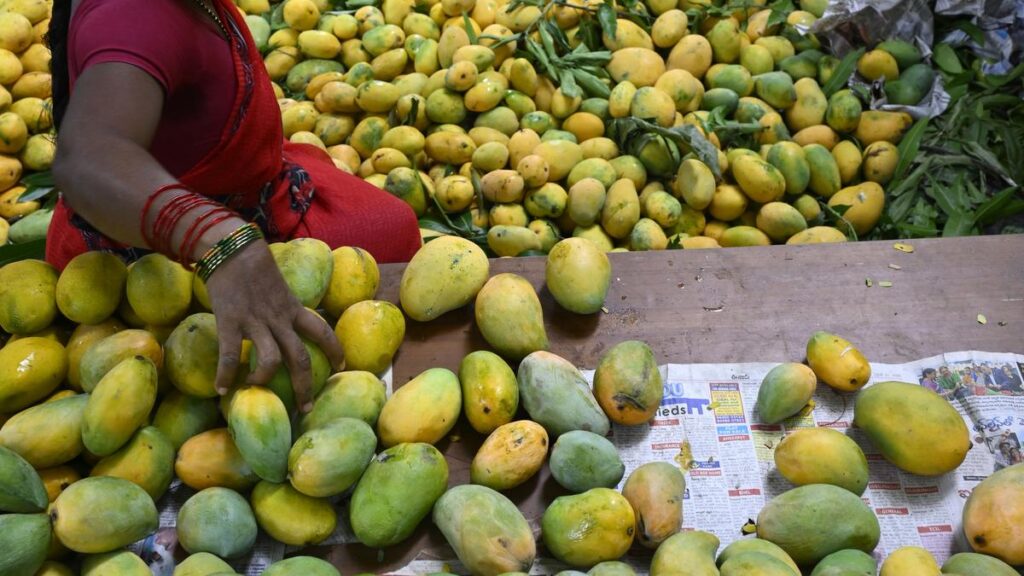From April to June, Hyderabad transforms into a vibrant tapestry of golden hues as its streets overflow with an exquisite array of mangoes. Besides the fruits from various parts of Telangana, lorries laden with varieties such as Himayat, Daseri, Benishan, Alphonso and Rasalu roll in from Andhra Pradesh, Karnataka, Maharashtra and Gujarat.
This season, however, the king of fruits had to weather quite a storm to reach the city. Early this year, unseasonal rains and winds struck Andhra Pradesh and Telangana, significantly impacting Hyderabad’s primary mango suppliers. This flooded the wholesale markets with unripe kairi [unripe mango variety in Hindi], which jacked up prices (₹200-₹400 a kg) early in the season, until market forces ironed out the spikes.
Batasingaram, the city’s mango hub, handles 3,000 to 5,000 quintals of the fruit daily in peak season, with average prices pegged around ₹2,345 a quintal. Jambagh, another market, processes 500–800 quintals in the initial days of the season and 1,000-1,500 quintals in April.

Hyderabad receives mangoes from various parts of Telangana and other States. The image is used for representative purposes only.
| Photo Credit:
MOHD ARIF
Vendors like Zubair in Kothapet are busy with customers, as buying mangoes becomes a cherished ritual for many in the city. “Himayat is the favourite,” notes one vendor. “We ripen these mangoes with calcium carbide just two days before sale.” Current prices are steady compared to last year, ranging from ₹70-₹200 a kg depending on the variety.
Disparity in prices
This mango season also presented a striking juxtaposition: traditional vendors vis-à-vis quick commerce giants who offer rapid doorstep delivery.
While retail shops sell organic Banganapalli variety at ₹150-₹400 a kg, a quick-commerce establishment charge ₹79.12 a kg. Consumers are reluctant to buy the fruit from street vendors owing to concerns about calcium carbide.
Abdul Qadeer, president of the Jambagh market, speaks for the vendors. “Farmers follow regulations. The fear surrounding [calcium] carbide harms their livelihood. Where would smaller vendors turn to if consumers begin shopping online for supposedly fresh and organic products?”
Concerns regarding artificial ripening has created a consumer section preferring farm-to-home alternatives. Raghavendra, who runs an online store, says he began selling mangoes online in 2011. He sources mangoes from Sadashivpet and Shamirpet and deliver them to homes in Hyderabad. For other cities, orders are routed via cargo buses.
The appeal goes beyond convenience. “These online services offer safer, organic options that I can trust,” opines Tahseen Farha, a customer from Attapur.
The online market is also reviving lesser-known varieties such as Panduri, once exclusive to the elite. “Last year, a customer sent us a photo holding our box outside a London landmark. That was surreal,” says Raghavendra, who has orders trickling in from European countries as well.
Takers of tangy flavour
Along with sweetness, there’s also a desire for tangy, spicy flavours. Pavan, who runs a store in Kukatpally Rythu Bazaar, sees it every summer. “This season noticed a drop in the sale of raw mangoes from 30-40 bags to 20 bags a day. People go to Andhra directly or order online,” he says. “But this is our tradition, so we hold on, even if the profit drops.”
A drop in sale of raw mangoes was observed this season. The image is used for representative purposes only.
| Photo Credit:
SIDDHANT THAKUR
Each mango here has a purpose: the tangy Tella Gulaabi for punchy pickles, sturdy Kothapalli Kobbari for shelf life and Jalaalu for the season’s final flavour, all arriving from Nuziveedu, Kakinada, and Vijayawada. “Customers still come to pick the right mango,” Mr. Pavan adds.
Pickle brands are seeing a rise in digital demand. “After COVID, more people started ordering online,” says Abhiruchi Swagruha Foods manager Sarveshwar Rao. “Many send pickles to relatives in the U.S.”
“Our children are in other countries, but we don’t want them to forget this taste,” says Lakshmi, a grandmother in her 60s. “We may not all sit together and make pickles anymore, but at least I can send them the same flavours I grew up with.”
Be it from roadside stalls, storied pickle shops or online farm-to-home startups, mangoes are the quintessential taste of summer for Hyderabadis. For them, the fruit is not just a delicacy, but a sentimental connection to culture, family and cherished memories.
(The students are interning with The Hindu-Hyderabad)
Published – May 26, 2025 04:56 pm IST
Source:https://www.thehindu.com/news/cities/Hyderabad/a-tale-of-sweet-and-tangy-mangoes-in-hyderabad/article69605881.ece

